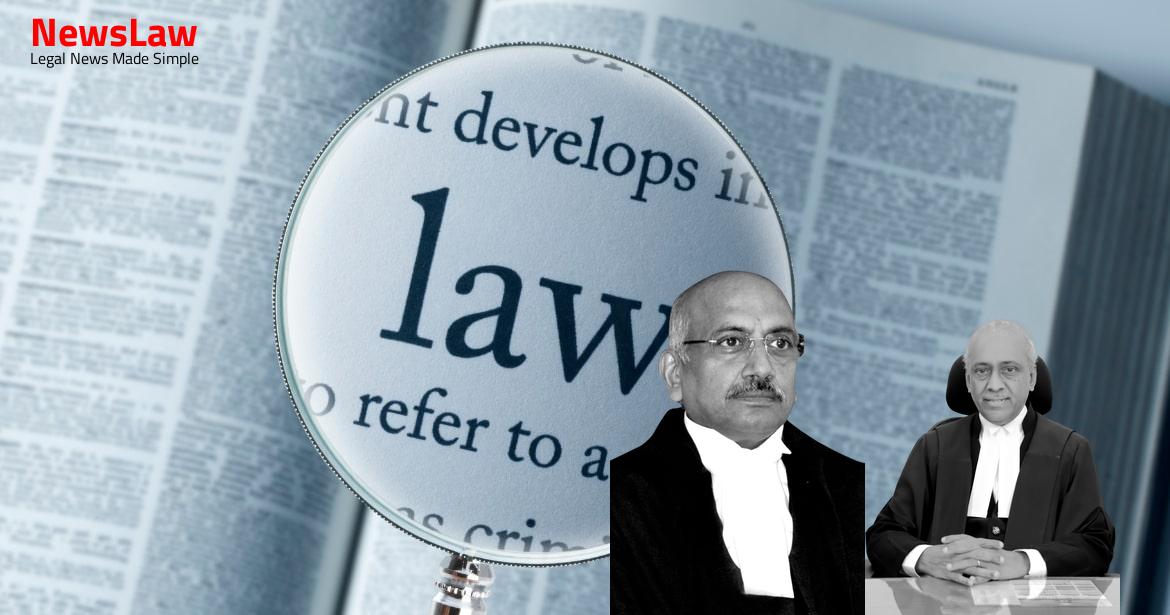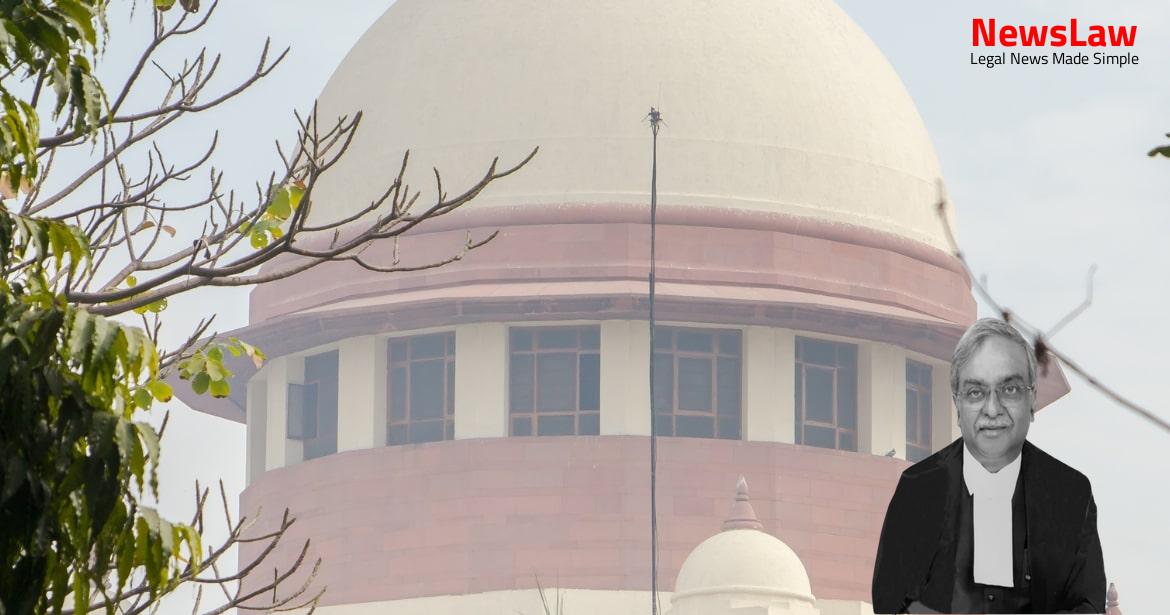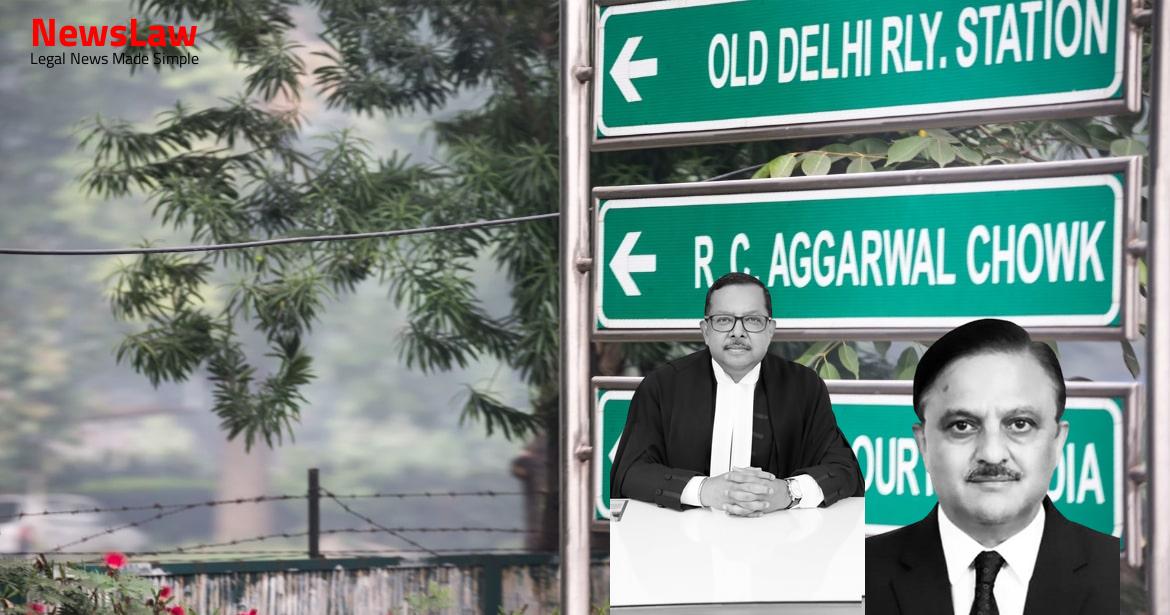Explore the detailed legal analysis conducted by the court in a service case regarding the conversion of a penalty from cashiering to a fine. The court’s examination of forfeiture of pension benefits based on Section 71 and Regulation 16(a) of the Army Act provides insight into the complexities of military law and disciplinary actions taken against individuals in service.
Facts
- Ex. Lt. Col. S. S. Bedi was convicted by the General Court Martial for committing a civil offence under Section 354 of the IPC.
- The conviction resulted in the sentence of cashiering from service which was later converted to a fine of Rs.50,000/- by the Tribunal.
- An application filed by Ex. Lt. Col. S. S. Bedi to file an Appeal was dismissed by the Tribunal.
- The Petitioner challenged the conviction and sentence of the General Court Martial before the Delhi High Court in 2010.
- The Tribunal found the punishment of cashiering shockingly disproportionate, leading to its conversion to a fine of Rs.50,000/-.
- Both the Appellant and the Union of India filed appeals against the Tribunal’s judgment regarding the conversion of the sentence from cashiering to a fine.
- The punishment under the Army Act for convicted persons by Court Martial includes cashiering and forfeiture of service for various purposes.
- In a similar case of Union of India v. P.K. Dutta (Retd.), the individual was Court Martialed and not only cashiered but also awarded three years’ rigorous imprisonment.
- Summary of evidence was cancelled on 01.10.1986 due to procedural irregularities and a de novo recording was directed
- Lt. Col. Sharma testified that touching private parts and squeezing nipples of patients was unnecessary
- Complaint made by two women on 15.05.1986 alleging misconduct during checkup by inappropriate touching
- Appellant posted at Base Hospital Lucknow as a Medical Specialist on 03.04.1984
- Convening authority directed trial by General Court Martial based on summary of evidence
- Charge sheet filed against Appellant on 29.11.1986
- Lt. Col. R. Sharma testified about the medical necessity of touching the complainant’s stomach and breasts during examination
- Appellant commissioned in the Indian Army Medical Corps on 24.07.1966
Also Read: Judicial Review of Answer Key in Teacher Selection Process
Arguments
- The Appellant’s counsel argued that the conviction is unsustainable due to improper appreciation of evidence by the General Court Martial and the Tribunal.
- The evidence of Mrs. Gita Ray in favor of the Appellant was allegedly not considered.
- Lt. Col. R. Sharma’s testimony was also said to be supportive of the Appellant.
- If the court rejects the submissions, the counsel requested that the sentence should not be altered.
- Argument was made that physical examinations of the complainants with specific ailments were necessary – one with bronchial asthma and the other with a duodenal ulcer.
- The Respondent’s counsel contended that there is sufficient evidence on record supporting the guilt of the Appellant, which has been correctly appreciated by the General Court Martial and the Tribunal.
- The Respondents are only concerned with the conversion of the penalty of cashiering to a fine of Rs.50,000/-
- The learned Additional Solicitor General argued against the conversion of sentence by the Tribunal as unwarranted
- The Appellant had misbehaved with two patients and expert evidence showed no necessity for the Appellant’s actions
- Mr. Sridhar argued that even if cashiering penalty is upheld, forfeiture of all pensionary benefits is not automatic
- The Appellant is entitled to pension payment as no specific order forfeiting pension benefits has been directed by the General Court Martial
Also Read: Jurisdiction and Substantial Questions of Law in Land Dispute Case
Analysis
- The delay in the complaint made against the Appellant was highlighted by the Tribunal.
- The necessity of examining the cardio vascular system of a patient with bronchial asthma was noted, but squeezing the breasts and nipples of a lady patient was deemed unnecessary.
- Regulation 16 (a) of the Army Pension Regulations allows for the forfeiture of pension of an officer cashiered from service at the discretion of the President.
- No false motive for implicating the Appellant was found in the complaint, leading to agreement with the General Court Martial and Tribunal’s conclusion of guilt.
- Section 71 (h) for forfeiting the pension of the Appellant was not invoked by the Respondents and no action under Regulation 16 (a) has been shown on record.
- Without an order under Section 71 (h), the pension of the Appellant cannot be forfeited, as highlighted in the submission by Mr. Sridhar.
- A stay on execution proceedings was placed by the Court in 2013, but the argument of double jeopardy due to punishment under Section 71 and Regulation 16 (a) was not accepted.
- The judgment of the Tribunal altering the punishment from cashiering to a fine of Rs.50,000/- is being appealed, pending for seven years.
- The Appellant’s contention of unsustainable conviction was rejected upon reviewing the evidence of the complainants detailing the misconduct during physical examination.
- The decision to not initiate proceedings under Regulation 16(a) of the Pension Regulations may be justified due to the ongoing appeals.
- The conviction of the Appellant was deemed sound based on the evidence and testimonies presented.
- Cashiering does not result in forfeiture of retiral benefits.
- Forfeiture of arrears of pay and allowances for a person sentenced to cashiering or dismissal is provided in Section 71 (k).
- Section 71 (h) deals with punishment relating to forfeiture of pension at the conclusion of Court Martial.
- There is no inconsistency between Section 71 (h) and Regulation 16 (a).
- Punishment under Section 71 of the Army Act and Regulation 16 (a) of the Pension Regulations are entirely different.
- Punishments under Section 71 include cashiering and forfeiture of service for the purpose of pension.
- The punishment imposed on the Appellant was only cashiering from service.
- Regulation 16 (a) deals with how the pension of an officer cashiered on dismissal or removal from service is to be handled.
- The Tribunal’s conversion of the punishment from cashiering to a fine of Rs. 50,000 was not convincing.
- The punishment of cashiering is restored due to the Appellant’s reprehensible conduct of abusing a position of trust as a Doctor.
Also Read: Challenge of Secured Creditor’s Procedure
Decision
- In case the Respondents choose not to start proceedings under Army Pension Regulations, the Appellant will be entitled to all pensionary benefits.
- The Appellant’s deposited amount of Rs.50,000/- will be refunded with interest accrued.
- The Respondents are directed to consider the Appellant’s entire service record and advanced age before deciding on initiating proceedings under the Army Pension Regulations.
- The Appeals have been disposed of, and the Respondents have the freedom to start proceedings under Pension Regulations for pension forfeiture.
- The Tribunal altered the cashiering sentence to a fine of Rs.50,000/- citing the Appellant’s spotless service record.
Case Title: UNION OF INDIA Vs. S.S.BEDI (2020 INSC 469)
Case Number: Crl.A. No.-000013-000013 / 2013



